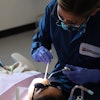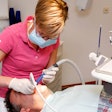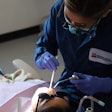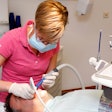Dental professionals made history on April 22, 2024. On that day, the seventh state (Maine) accepted the Dentist and Dental Hygienist Compact license agreement, thus activating it into initial legalization. This dream of allowing dental professionals to practice within numerous states with one license has been a work in progress over the past two years. However, it will most likely be another year before the compact license is available to those who want to apply for it.
 Tracee S. Dahm, MS, RDH.
Tracee S. Dahm, MS, RDH.
When the initial idea for the dental professional compact license was drawn up by the National Center for Interstate Compacts at the Council of State Governments, they had help. The organization worked alongside the U.S. Department of Defense, the American Dental Hygienists' Association, and the ADA.
Now that the minimum seven states (Iowa, Washington, Wisconsin, Tennessee, Virginia, Kansas, and Maine) have signed the license into legislation, the next process begins. In the next few months, appointed commissioners from each of these states will meet with the organizations mentioned above to begin the process of maintaining educational standards while practicing under one license.
Concerns have already been mentioned by dental professionals that the currently drafted educational standards and guidelines are not enough. In addition to maintaining the highest level of educational standards, the state commissioners and supporting organizations must also find a way to monitor the data of all dental professionals who have applied for the compact license so that each state has access to professionals' credentials.
Currently, the National Center for Interstate Compacts is estimating that a dental professional compact license will not be available for 12 to 18 months. There are currently eight more states that are considering adopting the license. If more states adopt the legislation, more state commissioners will need to meet.
Luckily for dental professionals, we are not the first health professionals to obtain a compact license. Compact licenses have been shown to be successful in that they improve access to care by offering more providers, their credentialing does not lower educational standards, and it can be monitored. Hopefully, the state commissioners can use the knowledge and experience from other health professionals' compact licenses as a guide to finalize the dental and dental hygienist compact license.
Editor's note: References available upon request.
Tracee S. Dahm, MS, RDH, is an adjunct clinical instructor for the North Idaho College School of Dental Hygiene in Coeur d’Alene, ID. She also works in private practice. Dahm has published articles in several dental journals, magazines, and a textbook. Her research interests include trends in dental hygiene and improving access to dental care for the underserved. She can be reached at [email protected].
The comments and observations expressed herein do not necessarily reflect the opinions of DrBicuspid.com, nor should they be construed as an endorsement or admonishment of any particular idea, vendor, or organization.



















